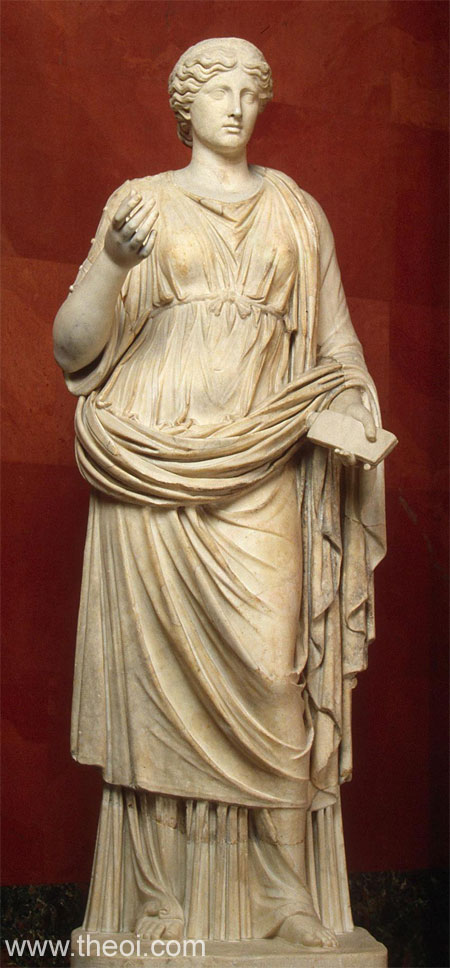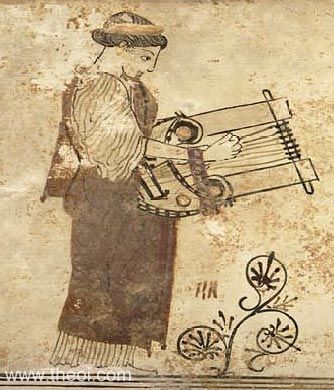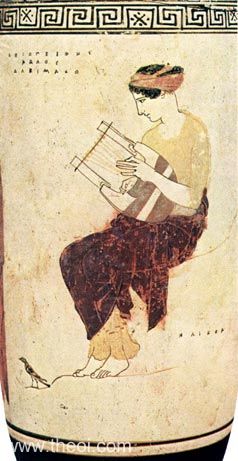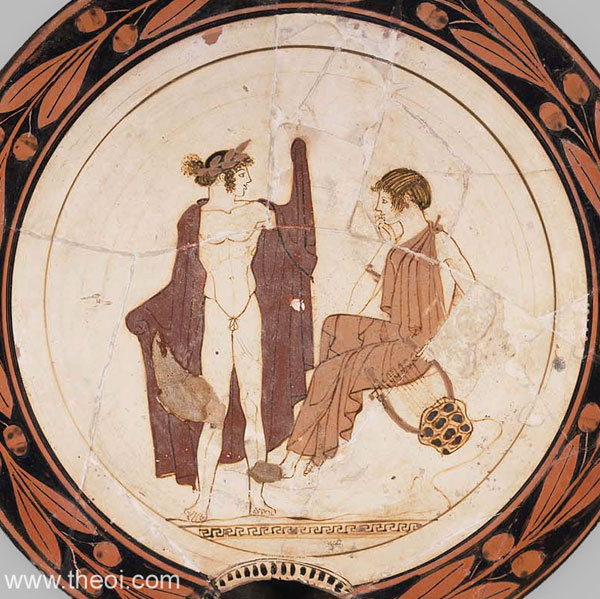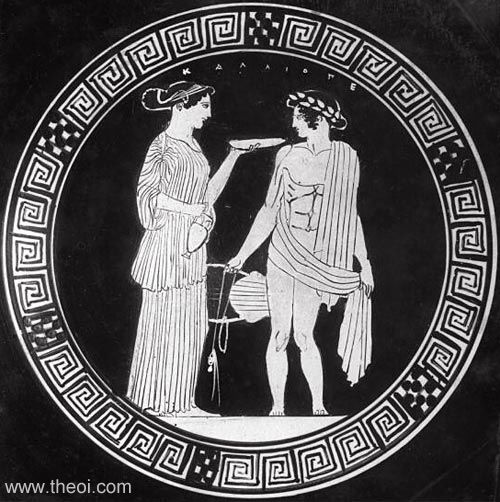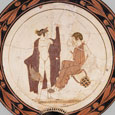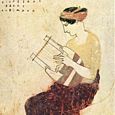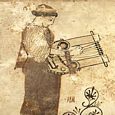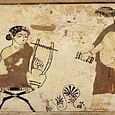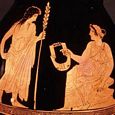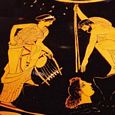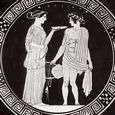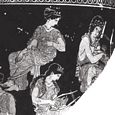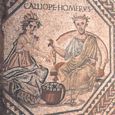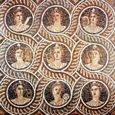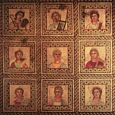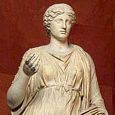CALLIOPE (Kalliope) - Greek Goddess Muse of Epic Poetry (original) (raw)
Greek Mythology >>Greek Gods >> Olympian Gods >> Muses >> Calliope (Kalliope)
Greek Name
Καλλιοπη Καλλιοπεια
Transliteration
Kalliopê, Kalliopeia
Translation
Beautiful-Voiced
Muse Calliope, Greco-Roman marble statue C2nd A.D., State Hermitage Museum
KALLIOPE (Calliope) was the eldest of the Mousai (Muses), the goddesses of music, song and dance. She was also the goddess of eloquence, who bestowed her gift on kings and princes. In the Classical era, when the Muses were assigned specific artistic spheres, Kalliope was named Muse of epic poetry. In this guise she was portrayed holding a tablet and stylus or a scroll. In older art she holds a lyre.
Kalliope was the mother of the bard Orpheus. When her son was dismembered by the Bakkhantes (Bacchantes), she recovered his head and enshrined on the island of Lesbos.
Her name means "beautiful-voiced" from the Greek words kallos and ops.
FAMILY OF CALLIOPE
PARENTS
[1.1] ZEUS & MNEMOSYNE (Hesiod Theogony 75, Apollodorus 1.13, Diodorus Siculus 4.7.1, Orphic Hymn 76)
[1.2] ZEUS (Alcman Frag, Hyginus Astronomica 2.7)
OFFSPRING
[1.1] ORPHEUS, LINOS (by Apollon) (Apollodorus 1.15)
[1.2] ) ORPHEUS (by Oiagros) (Pindar Dirges Frag 139, Bacchylides Frag 28, Apollodorus 1.15, Apollonius Rhodius 1.24, Hyginus Fabulae 14, Nonnus Dionysiaca 13.430)
[1.3] ORPHEUS (Terpander Frag 15, Timotheus Frag 791, Pausanias 9.30.1, Philostratus Younger 11, Callistratus 7)
[1.3] IALMENOS (Pindar Dirges Frag 139)
[1.4] LINOS (Suidas s.v. Ailinos)
[2.1] RHESOS (by Strymon) (Apollodorus 1.18)
[3.1] THE KORYBANTES (by Zeus) (Strabo 10.3.19)
CLASSICAL LITERATURE QUOTES
PARENTAGE OF CALLIOPE
Hesiod, Theogony 75 ff (trans. Evelyn-White) (Greek epic C8th or C7th B.C.) :
"The Mousai (Muses) sang who dwell on Olympos, nine daughters begotten by great Zeus, Kleio (Clio) and Euterpe, Thaleia (Thalia), Melpomene and Terpsikhore (Terpsichore), and Erato and Polymnia (Polyhymnia) and Ourania (Urania) and Kalliope (Calliope)."
Pseudo-Apollodorus, Bibliotheca 1. 13 (trans. Aldrich) (Greek mythographer C2nd A.D.) :
"Mnemosyne [bore to Zeus] the Mousai (Muses), the eldest of whom was Kalliope (Calliope), followed by Kleio (Clio), Melpomene, Euterpe, Erato, Terpsikhore (Terpsichore), Ourania (Urania), Thaleia (Thalia), and Polymnia."
Orphic Hymn 76 to the Muses (trans. Taylor) (Greek hymns C3rd B.C. to 2nd A.D.) :
"Daughters of Mnemosyne and Zeus . . . Kleio (Clio), and Erato who charms the sight, with thee, Euterpe, ministering delight : Thalia flourishing, Polymnia famed, Melpomene from skill in music named : Terpsikhore (Terpsichore), Ourania (Urania) heavenly bright."
CALLIOPE & HER SON ORPHEUS
Muse Calliope, Athenian red-figure pyxis C5th B.C., Museum of Fine Arts Boston
Homerica, Of the Origin of Homer & Hesiod & of their Contest, Fragment 1 (trans. Evelyn-White) (Greek epic B.C.) :
"And from Oiagros (Oeagrus) and Kalliope (Calliope) [was born] Orpheus."
Pindar, Dirges Fragment 139 (trans. Sandys) (Greek lyric C5th B.C.) :
"The son of Oiagros (Oeagrus) [and Kalliope (Calloipe)], Orpheus of the golden sword."
Terpander, Fragment 15 (from Timotheus, the Persians) (trans. Campbell, Vol. Greek Lyric II) (Greek lyric C7th B.C.) :
"Orpheus of the intricate music, son of Kalliope (Calliope)."
Bacchylides, Fragment 28 (trans. Campbell, Vol. Greek Lyric IV) (Greek lyric C5th B.C.) :
"[Orpheus] the renowned son of Oiagros (Oeagrus) . . . child of the lovely-haired Mousa (Muse)."
Timotheus, Fragment 791 (trans. Campbell, Vol. Greek Lyric V) (Greek lyric C5th B.C.) :
"Orpheus, Kalliope's (Calliope's) son, he of the intricate muse, was the first to beget the tortoise-shell lyre in Pieria."
Aeschylus, Bassarae or Bassarides (lost play) (Greek tragedy C5th B.C.) :
Aeschylus' lost play Bassarae described the death of Orpheus, son of Kalliope (Calliope). Weir Smyth (L.C.L.) summarises evidence for the plot : "Eratosthenes, Catasterismoi, says of Orpheus that he paid no honour to Dionysos, but considered Helios (the Sun) to be the greatest of the gods and addressed him as Apollon; that, by making haste during the night, he reached at dawn the summit of Mt. Pangaios (Pangaeus), and waited there that he might see the rising of the sun; and that Dionysos, in his wrath, sent against him the Bassarides (as Aeschylus tells the story), who tore him to pieces and scattered his members, which were collected and buried by the Mousai (Muses) in Leibethra." Presumably Kalliope appeared towards the end of the play lamenting her son.
Plato, The Republic 364d (trans. Shorey) (Greek philosopher C4th B.C.) :
"The [mystic] books of Musaios (Musaeus) and Orpheus, the offspring of Selene (Moon) and of the Mousa (Muse), as they affirm." [N.B. Both were mythic poets of the Orphic mysteries.]
Pseudo-Apollodorus, Bibliotheca 1. 14 (trans. Aldrich) (Greek mythographer C2nd A.D.) :
"Kalliope (Calliope) and Oiagros (Oeagrus), though nominally it was Apollon, had as sons Linos (Linus), whom Herakles (Heracles) slew, and Orpheus, a professional citharist whose singing caused stones and trees to move."
Muse Calliope on Helicon, Athenian red-figure lekythos C5th B.C., Staatliche Antikensammlungen
Apollonius Rhodius, Argonautica 1. 24 ff (trans. Rieu) (Greek epic C3rd B.C.) :
"Orpheus, borne, so the story goes, by Kalliope (Calliope) herself to her Thrakian (Thracian) lover Oiagros (Oeagrus) near the heights of Pimplea. They say that with the music of his voice he enchanted stubborn mountain rocks and rushing streams."
Pausanias, Description of Greece 9. 30. 1 (trans. Jones) (Greek travelogue C2nd A.D.) :
"[In the sanctuary of the Mousai (Muses) on Mount Helikon (Helicon) in Boiotia (Boeotia) :] The first images of the Mousai (Muses) are of them all, from the hand of Kephisodotos (Cephisodotus), while a little farther on are three, also from the hand of Kephisodotos, and three more by Strongylion . . . the remaining three were made by Olympiosthenes . . . by the side of Orpheus stands a statue of Telete, and around him are beasts of stone and bronze listening to his singing . . . Orpheus was a son of the Mousa Kalliope (Muse Calliope) . . . the beasts followed him fascinated by his songs, and that he went down alive to Haides to ask for his wife from the gods below."
Quintus Smyrnaeus, Fall of Troy 3. 631 ff (trans. Way) (Greek epic C4th A.D.) :
"[The Mousai (Muses) came to sing the dirge at the funeral of Akhilleus (Achilles) :] To Thetis spake Kalliope (Calliope), she in whose heart was steadfast wisdom throned : ‘From lamentation, Thetis, now forbear, and do not, in the frenzy of thy grief for thy lost son, provoke to wrath the Lord of Gods and men. Lo, even sons of Zeus, the Thunder-king, have perished, overborne by evil fate. Immortal though I be, mine own son Orpheus died, whose magic song drew all the forest-trees to follow him, and every craggy rock and river-stream, and blasts of winds shrill-piping stormy-breathed, and birds that dart through air on rushing wings. yet I endured mine heavy sorrow : Gods ought not with anguished grief to vex their souls. Therefore make end of sorrow-stricken wail for thy brave child; for to the sons of earth minstrels shall chant his glory and his might, by mine and by my sisters' inspiration, unto the end of time. Let not thy soul be crushed by dark grief, nor do thou lament like those frail mortal women. Know'st thou not that round all men which dwell upon the earth hovereth irresistible deadly Aisa (Aesa, Fate), who recks not even of the Gods? Such power she only hath for heritage. Yea, she soon shall destroy gold-wealthy Priamos' (Priam's) town, and Trojans many and Argives doom to death, whomso she will. No God can stay her hand.’ So in her wisdom spake Kalliope."
Philostratus the Younger, Imagines 6 (trans. Fairbanks) (Greek rhetorician C3rd A.D.) :
"That Orpheus, the son of the Mousa (Muse) [i.e. Kalliope (Calliope)], charmed by his music even creatures that have not the intelligence of man, all the writers of myth agree."
Philostratus the Younger, Imagines 11 :
"The man with erect tiara who sings in tune with the notes of his lyre . . . it is Orpheus, son of Kalliope (Callipe)."
Callistratus, Descriptions 7 (trans. Fairbanks) (Greek rhetorician C4th A.D.) :
"On Helikon (Helicon)--the spot is a shaded precinct sacred to the Mousai (Muses)--near the torrent of the river Olmeios and the violet-dark spring of Pegasos (Pegasus), there stood beside the [statues of the] Mousai (Muses) a statue of Orpheus, the son of Kalliope (Calliope), a statue most beautiful to look upon . . . He was carrying the lyre, which was equipped with as many notes as the number of the Mousai."
Pseudo-Hyginus, Fabulae 14 (trans. Grant) (Roman mythographer C2nd A.D.) :
"Orpheus son of Oeagrus and the Muse Calliope, from Thrace."
Pseudo-Hyginus, Astronomica 2. 7 :
"[Constellation] Lyre. The Lyre was put among the constellations for the following reason, as Eratosthenes [Greek writer C3rd B.C.] says . . . Orpheus, son of Calliope and Oeagrus, who was passionately devoted to music. It is thought that by his skill he could charm even wild beasts to listen . . . When Orpheus was taking delight in song, seated, as many say, on Mount Olympus . . . Liber [Dionysos] is said to have roused the Bacchanals against him. They slew him and dismembered his body. But others say that this happened because he had looked on the rites of Liber. The Musae gathered the scattered limbs and gave them burial, and as the greatest favour they could confer, they put as a memorial his lyre, pictures with stars, among the constellations. Apollo and Jove [Zeus] consented, for Orpheus had praised Apollo highly, and Jupiter [Zeus] granted this favour to his daughter."
Pseudo-Hyginus, Astronomica 2. 7 :
"Some also have said that Venus [Aphrodite] and Proserpina [Persephone] came to Jove [Zeus] for his decision, asking him to which of them he would grant Adonis. Calliope, the judge appointed by Jove, decided that each should posses him half of the year. But Venus [Aphrodite], angry because she had not been granted what she thought was her right, stirred the women in Thrace by love, each to seek Orpheus for herself, so that they tore him limb from limb. His head, carried down from the mountain into the sea, was cast by the waves upon the island of Lesbos. It was taken up and buried by the people of Lesbos, and in return for this kindness, they have the reputation of being exceedingly skilled in the art of music. The lyre, as we have said, was put by the Muses among the stars."
Apollo and Muse Calliope, Athenian red-figure kylix C5th B.C., Museum of Fine Arts Boston
Propertius, Elegies 2. 308 ff (trans. Goold) (Roman elegy C1st B.C.) :
"Nor need you address the maiden Musae (Muses) with awestruck lips : their company also knows what it means to love, if after all it is true that one of them [Kalliope (Calliope)] upon the rocks of Bistonia was once ravished by the semblance of Oeagrus."
Cicero, De Natura Deorum 3. 18 (trans. Rackham) (Roman rhetorician C1st B.C.) :
"What about the sons of goddesses? . . . [such as] Orpheus . . . whose mother was a Musa (Muse)."
Seneca, Medea 625 ff (trans. Miller) (Roman tragedy C1st A.D.) :
"That son [Orpheus] of the tuneful Camena [Muse], at whose sweet melodies the swift stream stood still and the winds were hushed, when the bird, leaving off its own singing, came near him, the whole wood following after."
Statius, Silvae 2. 7. 36 (trans. Mozley) (Roman poetry C1st A.D.) :
"Calliope took him [a new-born poet] to her loving bosom. Then first did she lay aside her grief and cease her long lament for Orpheus, and said : ‘O boy, consecrate to poesy, soon destined to outmatch the bards of old, [but] thou shalt move no rivers or wild herds of Thracian ash-trees with thy music [as Orpheus did].’"
Statius, Silvae 5. 3. 15 :
"Their [the Muses'] queen herself sinks her head upon the silent lyre, as when after Orpheus' loss she halted by thy stream O Hebrus, and gazed at the troops of beasts that listened no more, and the woods that moved not since the strains were gone."
Nonnus, Dionysiaca 13. 430 ff (trans. Rouse) (Greek epic C5th A.D.) :
"He [Oiagros (Oeagrus)] left Orpheus on Kalliopeia's (Calliope's) knees, a little one interested in his mother's milk, still a new thing."
Nonnus, Dionysiaca 22. 187 ff :
"Oiagros (Oeagrus) . . . doing deeds that needed Kalliopeia (Calliope) his consort, to tell them."
Nonnus, Dionysiaca 22. 322 ff :
"His [Oiagros'] bride Kalliopeia (Calliope), mother of a noble son [Orpheus]."
Nonnus, Dionysiaca 24. 77 ff :
"[When the Indian River Hydaspes tried to drown him and the army of Dionysos :] Kalliope (Calliope) lifted Oiagros (Oeagrus) upon her shoulders."
OTHER CHILDREN OF CALLIOPE
Pindar, Dirges Fragment 139 (trans. Sandys) (Greek lyric C5th B.C.) :
"But in another song did three goddesses [Mousai (Muses)] lull to rest the bodies of their sons . . . the third [Kalliope (Calliope)] sorrowed over Ialmenos (Ialmenus) [personification of the dirge], when his strength was stayed by the onset of a raging malady. But the son of Oiagros (Oeagrus) [and Kalliope (Calliope)], Orpheus of the golden sword."
Pseudo-Apollodorus, Bibliotheca 1. 18 (trans. Aldrich) (Greek mythographer C2nd A.D.) :
"Euterpe, or Kalliope (Calliope), according to some, bore to the river Strymon Rhesos (Rhesus), whom Diomedes murdered at Troy."
Strabo, Geography 10. 3. 19 (trans. Jones) (Greek geographer C1st B.C. to C1st A.D.) :
"Others say that the Korybantes (Corybantes) [of Samothrake (Samothrace)] were sons of Zeus and Kalliope (Calliope) and were identical with the Kabeiroi (Cabiri), and that these went off to Samothrake, which in earlier times was called Melite, and that their rites were mystical."
Suidas s.v. Ailinos (trans. Suda On Line) (Byzantine Greek lexicon C10th A.D.) :
"Ailinon (mournful, plaintive) : It is [used] equally to refer to a dirge and to refer to a hymn; from Ailinos (Aiilinus) the [son] of Kalliope (Calliope)."
CALLIOPE GODDESS OF EPIC POETRY & ELOQUENCE
Muse Calliope and Apollo, Athenian red-figure kylix C5th B.C., Victoria and Albert Museum
Hesiod, Theogony 75 ff (trans. Evelyn-White) (Greek epic C8th or C7th B.C.) :
"Kalliope (Calliope), who is the chiefest of them all [the Mousai (Muses)], for she attends on worshipful princes: whomsoever of heaven-nourished princes the daughters of great Zeus honour, and behold him at his birth, they pour sweet dew upon his tongue, and from his lips flow gracious words. All the people look towards him while he settles causes with true judgements: and he, speaking surely, would soon make wise end even of a great quarrel; for therefore are there princes wise in heart, because when the people are being misguided in their assembly, they set right the matter again with ease, persuading them with gentle words. And when he passes through a gathering, they greet him as a god with gentle reverence, and he is conspicuous amongst the assembled: such is the holy gift of the Mousai (Muses) to men."
Alcman, Fragment (trans. Campbell, Vol. Greek Lyric II) (Greek lyric C7th B.C.) :
"Come Moisa (Muse), Kalliope (Calliope), daughter of Zeus, begin the lovely verses; set desire on the song and make the choral dance graceful."
Stesichorus, Fragment 240 (trans. Campbell, Vol. Greek Lyric III) (C7th to 6th B.C.) :
"Come hither, clear-voiced Kallopeia (Calliope)."
Stesichorus, Fragment 275 :
"Excellent Kalliope (Calliope), admired for your poetry and songs."
Bacchylides, Fragment 5 (trans. Campbell, Vol. Greek Lyric IV) (Greek lyric C5th B.C.) :
"White-armed Kalliope (Calliope), halt your well-made chariot here: sing in praise of . . ."
Bacchylides, Fragment 19 :
"Countless paths of ambrosial verses lie open for him who obtains gifts from the Pierian Mousai (Muses) and whose songs are clothed with honour by the violet-eyed maidens, the garland-bearing Kharites (Charites, Graces). Weave, then, in lovely blessed Athens a new fabric, renowned Kean (Cean) fantasy: you must travel by the finest road, since you have obtained from Kalliope (Calliope) a surpulative prize."
Plato, Phaedrus 259 (trans. Fowler) (Greek philosopher C4th B.C.) :
"When they [the grasshoppers] die they go and inform the Mousai (Muses) in heaven who honours them on earth. They win the love of Terpsikhore (Terpsichore) for the dancers by their report of them; . . . of Kalliope (Calliope) the eldest Mousa (Muse) and of Ourania (Urania) who is next to her, for the philosophers, of whose music the grasshoppers make report to them; for these are the Mousai who are chiefly concerned with heaven and thought, divine as well as human, and they have the sweetest utterance."
Diodorus Siculus, Library of History 4. 7. 1 (trans. Oldfather) (Greek historian C1st B.C.) :
"Hesiod even gives their [the Mousai's (Muses')] names when he writes: ‘Kleio (Clio), Euterpe, and Thaleia, Melpomene, Terpsikhore (Terpsichore) and Erato, and Polymnia, Ourania (Urania), Kalliope (Calliope) too, of them all the most comely.’
To each of the Mousai (Muses) men assign her special aptitude for one of the branches of the liberal arts, such as poetry, song, pantomimic dancing, the round dance with music, the study of the stars, and the other liberal arts . . . For the name of each Mousa (Muse), they say, men have found a reason appropriate to her . . . Kalliope (Calliope), because of her beautiful (kale) voice (ops), that is, by reason of the exceeding beauty of her language she wins the approbation of her auditors."
Philostratus the Younger, Imagines 13 (trans. Fairbanks) (Greek rhetorician C3rd A.D.) :
"The gifts of the gods are not to be rejected, as you no doubt know, since you have heard it from one of the devotees of Kalliope (Calliope) [i.e. the epic poets]."
Ovid, Fasti 5. 79 ff (trans.Boyle) (Roman poetry C1st B.C. to C1st A.D.) :
"Then with ivy twining her neglected hair, Calliope began [the song], first of her group . . . She, too, had ended; her faction roared their support. What to do? All the parties are equal. May the Pierides [Muses] smile on me equally, and I extol none of them more or less."
Propertius, Elegies 3. 3 (trans. Goold) (Roman elegy C1st B.C.) :
"The nine Maidens [Muses], each allotted her own realm, busy their tender hands on their separate gifts . . . Then from their number one of the goddesses laid her hand on me (by her looks I think it was Calliope) : ‘You will always be happy to ride on snow-white swans; no galloping hooves of the war-horse will call you to arms. Be it no concern of yours to sound the martial summons on the blaring trumpet or stain with bloody warfare the groves of Helicon . . . For you will sing of garlanded lovers at another's threshold and the tipsy tokens of midnight vigil, so that he who would artfully outwit stern husbands may learns from you how to charm forth a locked-up woman.’
Thus Calliope, and taking water from the spring she moistened my lips with draughts [from the spring of Hippokrene (Hippocrene) on Mount Helikon] that once Philitas drank."
Propertius, Elegies 3. 2 :
"The Musae (Muses) are my friends, my poems are dear to the reader, and Calliope never wearies of dancing to my rhythms."
Propertius, Elegies 4. 6 :
"I shall tell, O Musa (Muse), of Apollo's temple on the Palatine : Calliope, the theme is worthy of your favour. My songs are sung for Caesar's glory: while Caesar is being sung, do even you pray attend, Jupiter [Zeus]!"
Statius, Thebaid 4. 32 ff (trans. Mozley) (Roman epic C1st A.D.) :
"Thou, Calliope, queen of the groves of song, uplift thy lyre and begin the tale."
Statius, Silvae 2. 7. 36 (trans. Mozley) (Roman poetry C1st A.D.) :
"Straightway, while yet a new-born babe he [the poet] drawled and with earliest accents sweetly whimpered, Calliope took him to her loving bosom. Then first did she lay aside her grief and cease her long lament for Orpheus, and said: ‘O boy, consecrate to poesy, soon destined to outmatch the bards of old, thou shalt move no rivers or wild herds of Thracian ash-trees with thy music, but with eloquent son shalt draw after thee the seven hills of Martian Tiber [Rome].’"
ANCIENT GREEK & ROMAN ART
K20.5 Muse Calliope & Apollo
Athenian Red Figure Vase Painting C5th B.C.
K20.4 Muse Calliope on Helicon
Athenian Red Figure Vase Painting C5th B.C.
K20.10C Calliope Playing Lyre
Athenian Red Figure Vase Painting C5th B.C.
K20.10 Thamyris & the Muses
Athenian Red Figure Vase Painting C5th B.C.
K20.3 Muse Calliope & Apollo
Athenian Red Figure Vase Painting C5th B.C.
K20.7 Calliope & the Head of Orpheus
Athenian Red Figure Vase Painting C5th B.C.
K20.9 Muse Calliope & Apollo
Athenian Red Figure Vase Painting C5th B.C.
K20.8 Calliope & the Muses
Athenian Red Figure Vase Painting C4th B.C.
Z20.1B Muse Calliope & Homer
Greco-Roman Vichten Mosaic C3rd A.D.
Z20.2 Portraits of the Nine Muses
Greco-Roman Cos Floor Mosaic A.D.
Z20.3 Portraits of the Nine Muses
Greco-Roman Trier Mosaic C3rd A.D.
S20.3A Statue of Muse Calliope
Greco-Roman Marble Statue C2nd A.D.
SOURCES
GREEK
- Hesiod, Theogony - Greek Epic C8th - 7th B.C.
- Homerica, The Origin of Homer and Hesiod - Greek Epic B.C.
- Pindar, Fragments - Greek Lyric C5th B.C.
- Greek Lyric I Terpander, Fragments - Greek Lyric C7th B.C.
- Greek Lyric I Alcman, Fragments - Greek Lyric C7th B.C.
- Greek Lyric III Stesichorus, Fragments - Greek Lyric C7th - 6th B.C.
- Greek Lyric IV Bacchylides, Fragments - Greek Lyric C5th B.C.
- Greek Lyric V Timotheus, Fragments - Greek Lyric C5th B.C.
- Aeschylus, Fragments - Greek Tragedy C5th B.C.
- Plato, Phaedrus - Greek Philosophy C4th B.C.
- Plato, Republic - Greek Philosophy C4th B.C.
- Apollodorus, The Library - Greek Mythography C2nd A.D.
- Apollonius Rhodius, The Argonautica - Greek Epic C3rd B.C.
- Diodorus Siculus, The Library of History - Greek History C1st B.C.
- Strabo, Geography - Greek Geography C1st B.C. - C1st A.D.
- Pausanias, Description of Greece - Greek Travelogue C2nd A.D.
- The Orphic Hymns - Greek Hymns C3rd B.C. - C2nd A.D.
- Philostratus the Younger, Imagines - Greek Rhetoric C3rd A.D.
- Callistratus, Descriptions - Greek Rhetoric C4th A.D.
- Quintus Smyrnaeus, Fall of Troy - Greek Epic C4th A.D.
- Nonnus, Dionysiaca - Greek Epic C5th A.D.
ROMAN
- Hyginus, Fabulae - Latin Mythography C2nd A.D.
- Hyginus, Astronomica - Latin Mythography C2nd A.D.
- Ovid, Fasti - Latin Poetry C1st B.C. - C1st A.D.
- Propertius, Elegies - Latin Elegy C1st B.C.
- Cicero, De Natura Deorum - Latin Rhetoric C1st B.C.
- Seneca, Medea - Latin Tragedy C1st A.D.
- Statius, Thebaid - Latin Epic C1st A.D.
- Statius, Silvae - Latin Poetry C1st A.D.
BYZANTINE
- Suidas, The Suda - Byzantine Greek Lexicon C10th A.D.
OTHER SOURCES
Other references not currently quoted here: Philostratus Heroicus 19.2, Catullus 61.2, Conon Narrations 45, Servius on Virgil's Aeneid 5.364, Zenobius 4.39.
BIBLIOGRAPHY
A complete bibliography of the translations quoted on this page.
